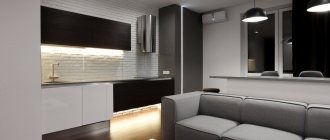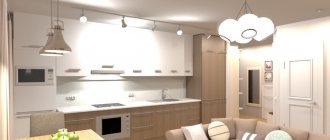Photo: zen.yandex.ru Bright sunlight looks amazing, but everything has its limit. Even in a welcoming living room, too much sun can sometimes cause discomfort. Therefore, do not rush to decisively abandon curtains, even if you are the happy owner of a luxurious panoramic view. Moreover, beautiful and well-chosen textiles are an amazing accessory for creating an atmosphere of home warmth and comfort!
Types of curtains for the living room
There are so many types and configurations of curtains that you can really get lost among them. The living room allows you to experiment with the most complex and original solutions that might be inappropriate in the kitchen or bedroom.
Classic curtains
Traditional curtains with curtains or tulle are in no hurry to lose ground. Especially in classic interiors. They can be decorated with tassels, clips, tiebacks, lambrequins, and create complex multi-level compositions.
Italian curtains
Italian curtains resemble classic ones, but with one significant difference: they do not slide apart along the eaves. You can open the window using side holders and grab bars. This is another traditional decorative solution for lush and rich styles.
Austrian curtains
Their lower part is gathered into beautiful decorative folds. Height and rise are adjustable using ties, loops and rings. These curtains are very elegant and decorative.
French curtains
Another decorative design reminiscent of its Austrian “colleagues”. The difference is that French curtains are gathered to the very top, along the entire length. They fall in graceful rounded waves and immediately give the room an atmosphere of solemnity.
English curtains
Another variation on the theme of curtains with tiebacks in height, but while Austrian and French curtains can have many such tiebacks, English curtains traditionally have two of them - with small indentations along the edges. In the best traditions of strict British classics.
Roman curtains
The age-old solution is now more relevant than ever: the best illustration of the cyclical nature of fashion. This is a dense canvas stretched over a rigid frame, which rolls out close to the window. It can be fixed at any height, completely opening or tightly closing the window.
Japanese curtains
Japanese curtains resemble a screen or those classic oriental sliding partitions. Lightweight vertical panels are stretched onto a frame that runs along the window.
Blackout
Blackout curtains completely block out sunlight, which is why they are most often used in bedrooms. But this option may also be appropriate in the living room. For example, if you often host movie nights in a makeshift home theater.
Priscilla curtains
In everyday life they are called crossed curtains. The two draperies are completely connected at the top edge, and the ends are pulled apart in different directions. The material is mostly translucent, because such curtains greatly darken the room. But they look soft and elegant.
Curtains-cafe
The café curtain frame is mounted in the middle of the window, not above it. They are rarely found in houses and apartments. But they create a comfortable and cozy effect of uniform diffused light in the room.
Methods for attaching curtains
With roller blinds everything is clear: the design is worked out in advance. You just need to secure it above the window. But classic curtains can be attached in different ways. Fortunately, the living room allows this too!
Ties
The canvas is attached to the cornice using laces, ribbons or braid. This option is not suitable for very heavy fabrics, because the knots will constantly unravel. But elegant bows will only emphasize the elegance of an airy curtain or tulle with an openwork floral pattern.
Loops
Ready-made decorative loops immediately run along the top of the curtain, which are put on the cornice. They differ from ties in that they do not need to be tied by hand. The loops can be solid or with fasteners in the form of buttons, buttons, or Velcro. The quantity is calculated taking into account the width and weight of the canvas.
Backstage
The cornice is inserted into an improvised fabric tunnel, similar to the hood tightening principle. Due to the absence of hard fasteners, such curtains are the quietest, but they are difficult to remove for washing and drape beautifully.
Braid
Decorative braid is sewn on top of the curtain, which creates small and frequent uniform folds. This texture cannot be replicated using other fasteners. Keep in mind that the piece of fabric for the braid should be one and a half to two times wider than the window opening.
Eyelets
Eyelets are special rings inserted into holes along the top of the curtain. They can be made of plastic or metal. If you make them to match the fabric, the eyelets are almost invisible when installed. And their main advantage is textured and uniform folds even on heavy curtains.
Rings and clamps
Curtain rings are one of the most common solutions in Europe and America. They differ from eyelets in that they are attached to the top edge of the fabric, rather than being “built into” it. Therefore, it is easier to remove such curtains from the cornice.
Living room interior design: features and ideas (70 photos)
Construction with a balcony
If the hall has not a simple window, but a balcony door, it will be more difficult to properly design this structure.
An important rule: you should not choose dark tones, unless they are immediately diluted with bright and rich colors.
This option looks good when the entire window and balcony block is completely hidden by a light green curtain of large width, and only a small corner is left to open the door. This is especially attractive when overlooking the night sky.
If you want to see the outline of the window sill and the exit to the balcony, installing decor from lilac vertical stripes is a completely original solution; they create a romantic twilight and still let in quite a lot of light.
Curtains for zoning the living room
Curtains and textile partitions are one of the classic ways of zoning space in the living room. Despite its simplicity, this solution has a number of advantages.
- Low cost. Even luxurious, expensive curtains are cheaper than complex stationary structures made of wood or glass;
— Easy to install. Hanging a curtain is much easier than installing a plasterboard partition. Anyone can do this easily;
- Mobility. If necessary, the curtains can be removed without leaving a trace. Of course, folding screens can also be removed, but even when folded they take up space, unlike a piece of fabric;
- Variety. Curtains can be easily changed according to the situation and mood. Updating textiles is the easiest way to refresh any interior;
- Easy to care for. It is enough to wash the curtains in the machine and hang them back.
But there are also disadvantages. Firstly, you will have to think about how to integrate the cornice into the ceiling structure. Secondly, textiles in the interior always require careful care, because even the most modern fabrics gradually absorb odors and dust.
Using curtains you can separate a soft corner, a work area, or an additional sleeping area. They will fit perfectly into combined studios for a symbolic separation of the kitchen, dining area, and living room itself.
Design Features
Curtains in a room play an important role; with their help you can fill the free space and balance all the interior elements. To decorate the living room correctly, the finished canvases must be made of high-quality materials using all kinds of new products.
To create a unique and modern style in the living room, curtains must have one of the following nuances:
- simplicity and ease;
- light shades, perhaps with bright accents;
- plain or geometric patterns;
- straight and concise lines;
- lack of ruffles, bows and other things;
- fastening in the form of eyelets or loops.
Modern curtains for the living room can be made of any material, even plastic or wood.
Curtains in different interior styles
A variety of shapes, fabrics and colors makes it easy to choose curtains for the living room to suit any interior. Both luxurious baroque and technological futurism will not be left without beautiful and functional curtains.
Country romance
Country, Provence, chalet, shabby chic, boho and their variations are cozy and warm village houses. Choose natural fabrics, pastel shades, floral patterns, small and elegant decor. Flounces, openwork inserts, braid, and tiebacks look good.
Pay attention to all the curtains falling in waves: Austrian, French and even more austere English. For a rough living room interior, linen curtains are good. Even burlap can be used to good effect in country music.
Palace luxury
Lush Baroque, Rococo, Empire, palace classics - all this requires scope and monumentality. Choose expensive luxurious fabrics, because even capricious velvet will be appropriate here. Create complex multi-level compositions.
Use abundant gold and silver decor, heavy lambrequins, voluminous tassels, and tiebacks. Change organza tulle to natural silk with embroidery. And for the most luxurious classic interiors, curtains are sewn by hand.
Pragmatic minimalism
Stylish technological minimalism, ultra-modern high-tech and eclectic contemporary still do not refuse curtains in the living room. The shape and materials are not so important here, but feel free to experiment with textures and colors.
Combine different fabrics and create bright accents from curtains. The right choice of textiles is the best alternative to excessive decor that does not fit into the concept of minimalism. Even the most laconic living room will become creative and individual.
Cozy eco-trends
In recent years, eco-trends and the maximum rejection of artificial materials have remained in fashion. This is reflected in different directions: from the popular Scandinavian style to the decorative Mediterranean style. In addition to natural fabrics, use the same natural shades: beige, brown, sand, green, blue. Instead of abstract geometry, there are sophisticated plant motifs. Such curtains are good with loops and ties.
Artistic industrialization
Even a rough and pragmatic industrial loft still uses textiles. And especially its softer and more neutral “descendants”, such as grunge in the interior.
Pay attention to the long thick bright curtains that cover the entire wall from ceiling to floor. Extend a long cornice and leave a small niche in the corner, and then, if desired, the windows can be fully opened and the curtains hidden. Or use roll structures. Roman curtains of their coarse fabrics in discreet terracotta, graphite, concrete shades will fit into the loft like family.
Curtains for the kitchen (65 photos): types, beautiful ideas
Basic rules when decorating windows
Curtains in cool shades visually expand the room
Decorating windows and pillows with the same fabric will create a harmonious combination.
Large window in the living room
A large window should become cozy, but small. Long curtains are considered an ideal option for decoration. When decorating, it is recommended to use dark or bright curtains. The ideal option for decorating such a window is considered to be a combination of tulle with a shimmer and curtains; the color of the fabrics should be combined.
Warm shades work well for large windows: yellow, orange or red
The most popular option is considered to be light straight curtains with eyelets. A large window is ideal for creating a heavy design. Lambrequins, fringe, ruffles, heavy folds, fringe, tweed, brocade, velvet, tapestry will make any living room luxurious, beautiful and cozy.
Curtains for windows in the living room interior
It is recommended to select curtains depending on the color and texture of the wallpaper
The color of the curtains can match the furniture or carpet
Disadvantages and advantages of curtains
Curtains allow you to decorate any interior, they give it uniqueness. In the cold season they protect the room from cold and wind, in the warm season they are used to create shade. A large assortment of shades allows you to choose an option for any interior.
Any curtains play both a decorative and functional role in the living room interior
There are practically no disadvantages to curtains; if necessary, you can always hang blinds or roller shutters.
Curtains for a small living room
Voluminous, expressive curtains and multi-level compositions are unlikely to suit a small living room. When saving space comes to the fore, choose curtains that fit as closely as possible to the window.
A good and practical choice is Roman blinds. They are the most compact and functional, but at the same time many times more elegant than plastic blinds. Light French or Austrian curtains will fit into romantic interiors. But be sure to choose thin and airy fabrics.
The main rule for a small living room is the simpler the better. Avoid massive designs and too dense and heavy fabrics. If you need complete protection from the sun, it is better to pay attention to blackout curtains than to massive velvet curtains.
Photo gallery: options for the right color combination
The curtain pattern matches the living room walls
The curtain pattern repeats the wallpaper print
The main background of the curtains is lighter than the walls, and the stripes match the tone of the furniture. Thanks to the slight tint, the curtains look like a continuation of the wall
The color scheme of the curtains is based on contrast - the light background is complemented by a print to match the furniture
The color of the curtains is matched to the color of the lampshade The texture of the curtains perfectly complements the interior The delicate pattern of the curtains complements the interior The floral print of the curtains is made in the same color scheme as the Roman blind
Curtains for the living room - photo
Can’t finally decide on the choice of curtains for the living room and hall? Do not rush! We have prepared a large selection of photos for you. Perhaps this is where you will find your ideal option!
Curtains for the bedroom in a modern style (70 photos)
How not to make a mistake
Of course, the main criterion when choosing curtains is the taste of the owners. But modern style has its own laws that should be taken into account so as not to disturb the harmony and stylistic completeness.
For a small living room, you should not use curtains with multi-level lambrequins - various throws and swags.
A complex multi-level lambrequin is well suited for decorating a large living room, but will look ridiculous in a small room
They will look ridiculous and will visually make the living room smaller.
Draperies are not the best solution for a small living room
Avoid complex draperies - they overload the interior. In a small living room, you should not use curtains with large patterns, so as not to upset the stylistic balance.











